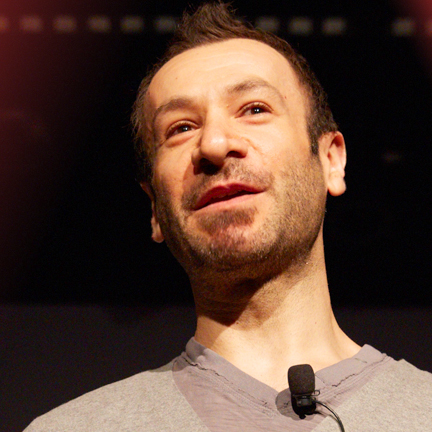At a Crossroads: Panos Panay on the Fusion of Music and Tech

Panos Panay
Boston’s Music Tech Fest enjoyed a Berklee twist this year. The festival, based at the Microsoft Research Labs in Cambridge (affectionately called the “Nerd” labs), provided a laid-back atmosphere for the music industry’s future leaders to share and discuss their ideas.
One of those leaders, Berklee’s Panos Panay (founder of Sonicbids and Berklee’s new Institute for Creative Entrepreneurship, as well as a 1994 Berklee alumnus) sat down briefly with Ken Zolot of MIT to discuss the entrepreneur’s role in an ever-changing music industry, and field questions from the audience about their respective programs. Zolot leads the Founder’s Journey at MIT, a program designed for students to harness their creative energy in an entrepreneurial setting. The Founder’s Journey’s hands-on approach has been incredibly well received, and is open to both MIT and Berklee students.
Due to time constraints, Panay and Zolot were only able to chat for approximately 15 minutes, but covered some interesting points about today’s music industry and the entrepreneurs who shape it.
On the Founder’s Journey bringing together Berklee and MIT students:
Both Panay and Zolot had a lot to say about the benefits of the Founder’s Journey program. Thanks to a music industry that is constantly in flux, and continues to evolve alongside and because of advances in technology, allowing Berklee students to sign up for the Founder’s Journey alongside the brightest minds at MIT was an obvious decision, Zolot explained. He said that by giving programmers, engineers, businessmen, and musicians an opportunity to work together to solve the problems of today, we can better prepare for the future.
On whether entrepreneurship can be taught:
A common problem in teaching entrepreneurship, explained Panay, is that the industry is constantly evolving. What has worked in the past will not always work in the present, and is almost certain not to work in the future. It borders on impossible to teach students to be able to adjust their ideas on the fly; this is something that must be learned through experience, he said.
Zolot had a similar approach to the problem of teaching entrepreneurship. “[We can’t] try to force creativity in entrepreneurship,” he said. “Rather than teaching students how to make something and promote it, we must teach them how to understand how consumers interact with their products and services.”
On what it takes to be a successful entrepreneur:
Panay, coming off his extremely successful venture into the industry with Sonicbids, which last year was sold for more than $15 million, spoke passionately about his approach to creativity in entrepreneurship. “Entrepreneurs have a sense that they want to play with what’s in front of them. [Successful entrepreneurs] get to that place by working day by day, and tackling small problems rather than working towards a grand creative vision.”
Panay acknowledged the inconsistency of this theory with what is widely believed to be the role of the entrepreneur in any given business, but was sure to explain that the most successful entrepreneurs are able to get to that place because they are able to break down and solve the small, everyday problems that get in the way of their creative vision. He explained that impatience is what most commonly dooms even the most creative entrepreneurs.
After a brief Q&A, mostly relating to Zolot’s process for teaching and the format of the Founder’s Journey program, it was time for the next panel. Panay is looking forward to continue experimenting with different methods of exposing students to the entrepreneurial process, and hopes that the BerkleeICE program, with its ties to MIT (as well as other Boston colleges), will help connect students and open the doors for new collaborative ideas to come to fruition.
